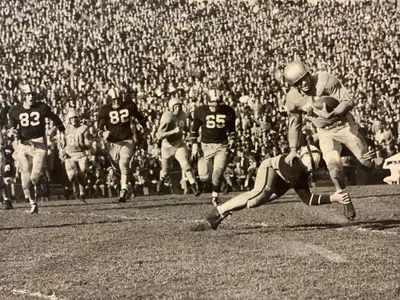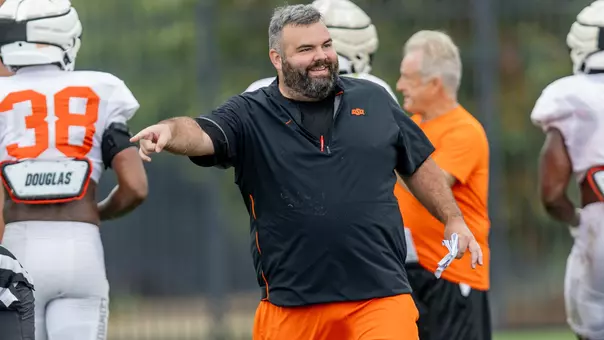
Columbia Athletics Mourns the Loss of Eugene Rossides '49CC '52LAW
5/18/2020 4:57:00 PM | Football
A Columbia Athletics Hall of Fame inductee and one of the heroes of Columbia's stunning 1947 upset win over Army, Eugene Rossides starred as a Lions quarterback from 1945-49, then went onto a successful career in government, politics and law.
NEW YORK—Columbia Athletics is saddened to learn of the passing of Athletic Hall of Fame inductee and former Columbia quarterback Eugene Rossides '49CC '52LAW.
"From his famous pass to Bill Swiacki that defeated Army in 1947 to his professional success in politics as a lawyer, Eugene Rossides' life is a model for what it means to be a true Columbia student-athlete," said Peter Pilling, Columbia's Campbell Family Director of Intercollegiate Athletics. "We send our deepest sympathies and condolences to his family and loved ones on his passing."
"Columbia Football is saddened to hear of the loss of Eugene Rossides," said Al Bagnoli, Columbia's Patricia and Shepard Alexander Head Coach of Football. "He has always been a strong supporter of Columbia Football. His life and football career provides an extraordinary example for our current student-athletes. Our thoughts and prayers are with Eugene's family."
Rossides at quarterback presided over a Golden Era of Columbia Football from 1945-48. As described by legendary New York City sportswriter Irving T. Marsh, "Gene Rossides, quarterback; John Nork, left halfback; Charles (Bill) Olson, right halfback, and Lou Kusserow, fullback, the greatest backfield ever produced on Morningside Heights." Rossides and Kusserow were referred to as the "Goal Dust Twins."
He is best remembered as the architect of the Lions' legendary 21-20 come-from-behind victory over Army in 1947, a win that snapped the Cadets' 32-game unbeaten streak. He threw the famous game-winning pass to Bill Swiacki that completed Columbia's comeback.
Rossides was a four-year letterwinner during those glory days for the Lions and still holds the school record for scoring during a single game with five touchdowns in a 34-26 win over Cornell in 1945.
During those four years, Rossides led the Lions to a superb 25-11 four-year record, a winning percentage that ranks among the best spans in school history. As an all-around performer, he completed 167 of 323 passes for 2,637 yards and 29 touchdowns, rushed 341 times for 1,110 yards and 17 touchdowns, and caught 12 passes for 166 yards. He was also a major factor in the return game as he concluded his career with 47 punt returns for 713 yards (15.2 average) and a touchdown and 39 kickoff returns for 809 yards (20.7 average). On defense, he intercepted nine passes for 115 return yards. He was named a Third Team All-American in 1945 by the Central Press Association.
But it was with the Columbia Debate Council that Rossides found his true calling in life. Following an outstanding football career at Columbia, Rossides was drafted by the NFL's New York Giants in 1949. He declined the offer to play professional football and instead, chose to attend Columbia Law School, stating that, "law presents more of a challenge for me. I hope to get into politics."
A Brooklyn, N.Y. native, Rossides followed through with that statement, serving as Assistant Attorney General for New York State and was appointed Undersecretary of the Treasury by President Richard Nixon in 1969. Rossides returned to practice law privately in New York in the 1970s and became a leading activist for Greek and Turkish issues on an international scale.
He retired as a senior partner of the law firm of Rogers and Wells, now Clifford Chance, LLP, where his career spanned nearly 40 years. He served as Assistant Secretary of the U.S. Treasury Department from 1969-1973, where he supervised the U.S. Customs Service, Secret Service, the US Mint, the Bureau of Printing and Engraving, the Tariff and Trade Office of Law Enforcement, the Federal Law Enforcement Training Center and the IRS law enforcement operations. In 1970, he successfully enforced landmark anti-dumping laws. In 1972, he established the Bureau of Alcohol, Tobacco, and Firearms. Notably, in 1972 he appointed the first women to be Federal Law Enforcement Officers, inducting them into the US Secret Service.
A leading Greek American, Rossides also served as U.S. Representative and Vice President of Interpol (1969-1973); Assistant to the Undersecretary of Treasury in the Eisenhower Administration (1958-1961); and started his legal career in the New York County District Attorney's office as Assistant AG in NY (1956-58) after serving in the US Air Force at Wright Patterson Air Force Base, Dayton, Ohio.
He was honored several times by Columbia University. In 1972, he earned Columbia's Medal of Excellence and in 1974, he was honored with the John Jay Award by the Columbia College Alumni Association. Rossides was also granted the Silver Anniversary award by the National Collegiate Athletic Association in 1974.
Rossides also authored numerous articles on international tariff and trade, the rule of law, and the book "Kissinger & Cyprus - A Study in Lawlessness" (2014). He was also a founding member of the Eisenhower Institute.
In 2000, Rossides joined his fellow "Goal Dust Twin" on Columbia Football's Team of the 20th Century. In 2008, Rossides joined Kusserow in the Columbia Athletics Hall of Fame.
"From his famous pass to Bill Swiacki that defeated Army in 1947 to his professional success in politics as a lawyer, Eugene Rossides' life is a model for what it means to be a true Columbia student-athlete," said Peter Pilling, Columbia's Campbell Family Director of Intercollegiate Athletics. "We send our deepest sympathies and condolences to his family and loved ones on his passing."
"Columbia Football is saddened to hear of the loss of Eugene Rossides," said Al Bagnoli, Columbia's Patricia and Shepard Alexander Head Coach of Football. "He has always been a strong supporter of Columbia Football. His life and football career provides an extraordinary example for our current student-athletes. Our thoughts and prayers are with Eugene's family."
Rossides at quarterback presided over a Golden Era of Columbia Football from 1945-48. As described by legendary New York City sportswriter Irving T. Marsh, "Gene Rossides, quarterback; John Nork, left halfback; Charles (Bill) Olson, right halfback, and Lou Kusserow, fullback, the greatest backfield ever produced on Morningside Heights." Rossides and Kusserow were referred to as the "Goal Dust Twins."
He is best remembered as the architect of the Lions' legendary 21-20 come-from-behind victory over Army in 1947, a win that snapped the Cadets' 32-game unbeaten streak. He threw the famous game-winning pass to Bill Swiacki that completed Columbia's comeback.
Rossides was a four-year letterwinner during those glory days for the Lions and still holds the school record for scoring during a single game with five touchdowns in a 34-26 win over Cornell in 1945.
During those four years, Rossides led the Lions to a superb 25-11 four-year record, a winning percentage that ranks among the best spans in school history. As an all-around performer, he completed 167 of 323 passes for 2,637 yards and 29 touchdowns, rushed 341 times for 1,110 yards and 17 touchdowns, and caught 12 passes for 166 yards. He was also a major factor in the return game as he concluded his career with 47 punt returns for 713 yards (15.2 average) and a touchdown and 39 kickoff returns for 809 yards (20.7 average). On defense, he intercepted nine passes for 115 return yards. He was named a Third Team All-American in 1945 by the Central Press Association.
But it was with the Columbia Debate Council that Rossides found his true calling in life. Following an outstanding football career at Columbia, Rossides was drafted by the NFL's New York Giants in 1949. He declined the offer to play professional football and instead, chose to attend Columbia Law School, stating that, "law presents more of a challenge for me. I hope to get into politics."
A Brooklyn, N.Y. native, Rossides followed through with that statement, serving as Assistant Attorney General for New York State and was appointed Undersecretary of the Treasury by President Richard Nixon in 1969. Rossides returned to practice law privately in New York in the 1970s and became a leading activist for Greek and Turkish issues on an international scale.
He retired as a senior partner of the law firm of Rogers and Wells, now Clifford Chance, LLP, where his career spanned nearly 40 years. He served as Assistant Secretary of the U.S. Treasury Department from 1969-1973, where he supervised the U.S. Customs Service, Secret Service, the US Mint, the Bureau of Printing and Engraving, the Tariff and Trade Office of Law Enforcement, the Federal Law Enforcement Training Center and the IRS law enforcement operations. In 1970, he successfully enforced landmark anti-dumping laws. In 1972, he established the Bureau of Alcohol, Tobacco, and Firearms. Notably, in 1972 he appointed the first women to be Federal Law Enforcement Officers, inducting them into the US Secret Service.
A leading Greek American, Rossides also served as U.S. Representative and Vice President of Interpol (1969-1973); Assistant to the Undersecretary of Treasury in the Eisenhower Administration (1958-1961); and started his legal career in the New York County District Attorney's office as Assistant AG in NY (1956-58) after serving in the US Air Force at Wright Patterson Air Force Base, Dayton, Ohio.
He was honored several times by Columbia University. In 1972, he earned Columbia's Medal of Excellence and in 1974, he was honored with the John Jay Award by the Columbia College Alumni Association. Rossides was also granted the Silver Anniversary award by the National Collegiate Athletic Association in 1974.
Rossides also authored numerous articles on international tariff and trade, the rule of law, and the book "Kissinger & Cyprus - A Study in Lawlessness" (2014). He was also a founding member of the Eisenhower Institute.
In 2000, Rossides joined his fellow "Goal Dust Twin" on Columbia Football's Team of the 20th Century. In 2008, Rossides joined Kusserow in the Columbia Athletics Hall of Fame.
Highlights: FB | Columbia 29, Cornell 12
Saturday, November 22
Preview: FB | Coach Poppe - Week 10 | Presented by Amity Hall Uptown
Friday, November 21
Podcast: FB | Captains' Corner (S7, E10)
Thursday, November 20
Postgame: FB | Coach Poppe after Brown
Saturday, November 15











